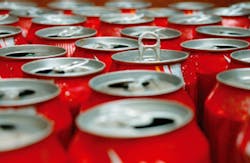Global beverage manufacturer to participate in region’s inaugural International Water Summit
The Coca-Cola Company will discuss global and regional methods of water footprint reduction during the International Water Summit (IWS) taking place in Abu Dhabi from Jan. 15-17.
Coca-Cola will also discuss the various social initiatives it has launched in the Middle East as a response to the serious water challenge the region faces, according to Antoine Tayyar, Public Affairs and Communications Director, Coca-Cola Middle East.
"Coca Cola's global water stewardship goal is to safely return to nature and to communities an amount of water equivalent to what is uses in all its beverages and their production by 2020," Tayyar said.
The Coca-Cola system has a series of water targets it hopes to achieve said Tayyar, including "reducing its water-use ratio to improve water efficiency [and] recycling water used in its manufacturing processes at all plants by ensuring water is treated and returned to the environment at a level that supports aquatic life".
Since 2005, Coca-Cola has been involved with 386 community water projects across 94 countries. In the last five years, the company has invested almost $250m in community water partnerships with 532 global organisations, including WWF, USAID, The Nature Conservancy, CARE, UNDP.
Examples of some of the community initiatives are: watershed protection, expanding community drinking water and sanitation access, water for productive use, agricultural water efficiency as well as education and awareness programmes.
Coca-Cola improved its water efficiency by 19.4% between 2004 and 2011. Based on 2010 unit-case volume, Coca-Cola estimates that 35%, or 53.3 billion litres, of the water used in its finished beverages has been replenished through the 386 community water projects.
According to the Washington-based World Bank, the Middle East and North Africa region is the most water-scarce region in the world. Home to 6.3% of the world's population yet it has just 1.4% of the world's renewable fresh water. With rapid urbanisation taking place across the Middle East and huge investments being made in infrastructure together with a parallel growth in population, water security has been boosted up the agenda. Based on current estimates, water availability in the region is expected to fall by half by 2050 and will have reached absolute water scarcity by 2025.
About two-thirds of the Middle East and North Africa's water requirements are currently supplied through desalination. This is not an option that can be sustained in the long-term due to a lack of rivers in the region and no existing technologies which meet the region's rising demand for fresh water. The GCC has become the global leader in desalination; a title that evolved out of necessity due to the region's desert landscape.
To address the issue, the GCC is planning to develop about $100-120bn-worth of water infrastructure projects, predominantly in Saudi Arabia and the UAE. The amount of investment reflects the importance the region's authorities have placed on the issue. These projects are aimed at increasing desalination capacity by 71% by 2016.
"Water resources face serious challenges around the world. By 2025, two-thirds of the world's population may live in areas with moderate to severe water shortages. Working collaboratively with other businesses, governments and civil society organisations, we believe we can make a positive difference on the world's water challenges. We hope the International Water Summit will bring to light both the necessity and the solutions to water conservation," Tayyar concluded.
The IWS will focus on promoting water sustainability in arid regions. Held alongside the 6th annual World Future Energy Summit, the IWS will bring together global leaders, municipalities, utilities and consultants from the public and private sector to hold discussions on the challenges, trends and solutions to water sustainability on an international platform.
Abu Dhabi Sustainability Week will be hosted by Masdar, Abu Dhabi's multi-faceted renewable energy company. For more information, visit http://iwsabudhabi.com
